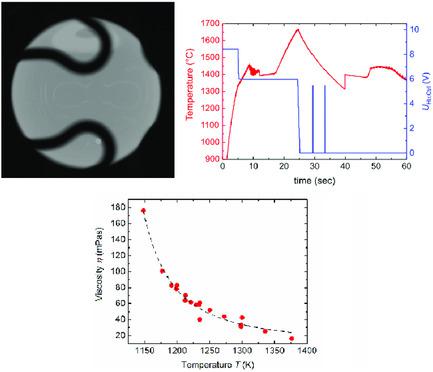当前位置:
X-MOL 学术
›
Adv. Eng. Mater.
›
论文详情
Our official English website, www.x-mol.net, welcomes your
feedback! (Note: you will need to create a separate account there.)
Investigating Thermophysical Properties Under Microgravity: A Review
Advanced Engineering Materials ( IF 3.4 ) Pub Date : 2020-12-01 , DOI: 10.1002/adem.202001223 Markus Mohr 1 , Hans-Jörg Fecht 1
Advanced Engineering Materials ( IF 3.4 ) Pub Date : 2020-12-01 , DOI: 10.1002/adem.202001223 Markus Mohr 1 , Hans-Jörg Fecht 1
Affiliation

|
The advancement of metallic alloys is generally driven by alloy development, but furthermore requires the development of suitable production and processing routines. Almost all metallic products are formed through the solidification processing from the liquid phase. Although the solid‐state is not influenced by gravitational effects, the processing of liquids is strongly impacted by earth's gravity—this influences interface phenomena, momentum, heat, and mass transport and, consequently, the solidification events. Experiments on liquid metallic alloys in microgravity avoid these influences and therefore allow benchmark experiments. This allows, for example, to obtain reliable thermophysical properties, improve the understanding of nucleation, phase selection, crystal growth, and other basic features of the liquid phase and the liquid–solid transition. The basic methodology, as well as a number of recent results obtained in the long‐duration microgravity environment on board the international space station, are presented and discussed.
中文翻译:

在微重力下研究热物理性质:综述
金属合金的进步通常是由合金的发展所驱动,但是还需要发展合适的生产和加工程序。几乎所有的金属产品都是通过液相的固化过程形成的。尽管固态不受重力作用的影响,但液体的处理却受到地球重力的强烈影响,这会影响界面现象,动量,热量和质量传递,进而影响固化事件。在微重力下对液态金属合金进行的实验避免了这些影响,因此可以进行基准实验。举例来说,这可让您获得可靠的热物理性质,增进对成核,相选择,晶体生长,以及液相和液固转变的其他基本特征。介绍并讨论了基本方法,以及在国际空间站上的长期微重力环境中获得的一些最新结果。
更新日期:2020-12-01
中文翻译:

在微重力下研究热物理性质:综述
金属合金的进步通常是由合金的发展所驱动,但是还需要发展合适的生产和加工程序。几乎所有的金属产品都是通过液相的固化过程形成的。尽管固态不受重力作用的影响,但液体的处理却受到地球重力的强烈影响,这会影响界面现象,动量,热量和质量传递,进而影响固化事件。在微重力下对液态金属合金进行的实验避免了这些影响,因此可以进行基准实验。举例来说,这可让您获得可靠的热物理性质,增进对成核,相选择,晶体生长,以及液相和液固转变的其他基本特征。介绍并讨论了基本方法,以及在国际空间站上的长期微重力环境中获得的一些最新结果。











































 京公网安备 11010802027423号
京公网安备 11010802027423号